Archive for October, 2012

Woman dies in ETH crash
 (CNS): Update 1:25pm — The Esterley Tibbetts Highway is now open for traffic. Part of the road was closed this morning following a crash in which a woman died. Police say a man was arrested following the crash. About 6:07am a Nissan box truck, which was traveling towards George Town, and a Hyundai van, which was travelling towards West Bay, collided on the ETH, close to the AL Thomson roundabout. Police say the female driver of the Hyundai died at the scene. The male driver of the truck was not injured and has been arrested on suspicion of causing death by careless driving and suspicion of DUI.
(CNS): Update 1:25pm — The Esterley Tibbetts Highway is now open for traffic. Part of the road was closed this morning following a crash in which a woman died. Police say a man was arrested following the crash. About 6:07am a Nissan box truck, which was traveling towards George Town, and a Hyundai van, which was travelling towards West Bay, collided on the ETH, close to the AL Thomson roundabout. Police say the female driver of the Hyundai died at the scene. The male driver of the truck was not injured and has been arrested on suspicion of causing death by careless driving and suspicion of DUI.
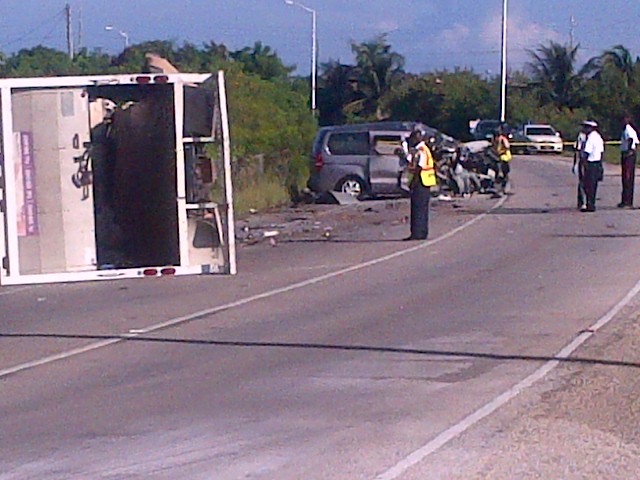
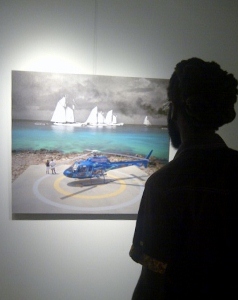
Photographer presents a ‘wormhole’ to the past
 (CNS): A new photographic exhibition at the National Gallery presents a new and interesting take on Cayman with a merging of the old and the new. In "Now & Then" Courtney Platt takes archive photographs and merges them with modern day shots taken from the same perspective. The result goes beyond nostalgia and is haunting in its recollection of the ‘islands that time forgot’ and its way of life. Schooners merge with helicopters and modern offices push their way into quiet street scenes. Platt describes the unique pictures as "wormholes to the past" and the creation of the exhibition as an incredibly moving experience.
(CNS): A new photographic exhibition at the National Gallery presents a new and interesting take on Cayman with a merging of the old and the new. In "Now & Then" Courtney Platt takes archive photographs and merges them with modern day shots taken from the same perspective. The result goes beyond nostalgia and is haunting in its recollection of the ‘islands that time forgot’ and its way of life. Schooners merge with helicopters and modern offices push their way into quiet street scenes. Platt describes the unique pictures as "wormholes to the past" and the creation of the exhibition as an incredibly moving experience.
“Past and current landmarks, buildings, events and generations of people blend together in a surreal and at times haunting mixture of imagery, “ said Natalie Urquhart, the gallery’s director. “They evoke a way of life that is rapidly becoming confined to memory and remind us of the importance of preserving our unique heritage before it is lost.”
The exhibition uses archive footage from the Cayman Free Press Steinmetz Collection and is open at the Gallery on Esterley Tibbetts Highway until 11 December.

Crown taking steps to find missing ex-bar manager
(CNS): The office of the director of public prosecutions (DPP) has said that it is taking steps to try and locate Arthur Screaton, a Canadian national and permanent resident of the Cayman Islands who absconded before his trial, leaving a $10,000 bond. The 53-year-old former bar manager is accused of stealing around CI$10,850 from Rackhams in downtown George Town through false accounting back in 2010. Having pleaded not guilty in March of this year, Screaton was due to be tried last month but was given a bail variation and allowed to travel to the United States. The crown did not object to the bail variation as a result of the bond and because Screaton was said to have close ties to the community.
However, Sreaton missed a court appearance just ahead of the trial and failed to turn up on the morning of 17 September when his case was set to be heard. The trial was vacated and a warrant issued for his arrest, but the crown says it is now seeking ways to have Screaton returned to Cayman.
Although it is not clear where he is, crown counsel told the judge Friday that the DPP was exploring various possibilities. Screaton could be in his native Canada but it is not known if the Cayman Islands has an official extradition treaty with the North American country, leaving his forced return in question even if the crown can locate the fugitive. The crown has not yet stated if it will try Screaton in his absence if he cannot be located or returned to Cayman.

Machete robbers hit WB shop
(CNS): Two masked men armed with machetes held up a local grocery store in West Bay, just after 8pm on Monday evening. An RCIPS spokesperson said the heist took place at Leta’s Plaza on Watercourse Road. The two suspects entered the shop and demanded cash from the lone cashier working in the store. The men took an undisclosed sum of money then fled the store on foot and were last seen running towards Boatswain Bay. The first armed masked man was described as being around 6ft” in height with a dark complexion and the 2nd was about 5’5”, slim built. Both men were wearing black long sleeve shirts and black long pants.
Anyone who was in the area at the time and has any information that can assist with the investigation is asked to contact the West Bay Police Station at 949-3999, the RCIPS tip-line 949-7777 or the confidential Crime Stoppers number 800-8477(TIPS).
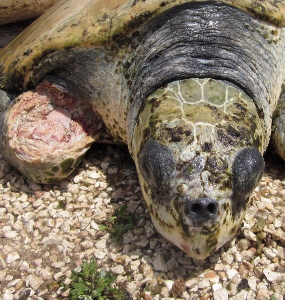
CTF evidence “watertight”
 (CNS): The global animal protection group calling for the Cayman Turtle Farm to alter its model and become a conservation facility rather than a farm is standing by its report, saying it is based on “watertight evidence”. Following a statement released by the Farm on Friday criticising the WSPA and denying the findings, the activists have said their claims are based on “photographic evidence and peer reviewed scientific analysis”, which revealed many welfare issues, including overcrowding, disease, cannibalism and unnecessary prolonged suffering. The WSPA said it has tried to work with the CTF and only in the face of its failure to act has it gone public with the damning report in the hope that it will move to address the concerns raised by the research.
(CNS): The global animal protection group calling for the Cayman Turtle Farm to alter its model and become a conservation facility rather than a farm is standing by its report, saying it is based on “watertight evidence”. Following a statement released by the Farm on Friday criticising the WSPA and denying the findings, the activists have said their claims are based on “photographic evidence and peer reviewed scientific analysis”, which revealed many welfare issues, including overcrowding, disease, cannibalism and unnecessary prolonged suffering. The WSPA said it has tried to work with the CTF and only in the face of its failure to act has it gone public with the damning report in the hope that it will move to address the concerns raised by the research.
“Our claims against the Cayman Turtle Farm (CTF) are founded on evidence gathered during a comprehensive, 18 month investigation into the treatment of the sea turtles at the CTF,” the World Society for the Protection of Animals said Monday in a statement released to the press. “This evidence is the basis for our compelling arguments against the CTF and is in the form of footage and photographic evidence and peer reviewed scientific analysis. WSPA does not initiate campaigns such as this without watertight evidence.”
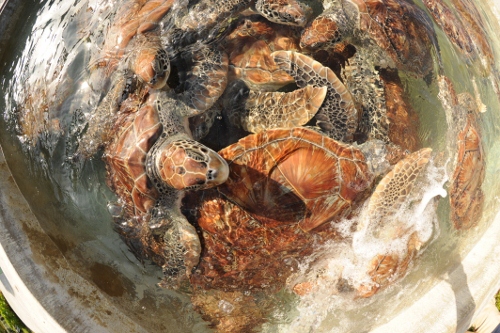 The activists explained that the investigation was carried out following a number of complaints made last year by scientific experts and visitors to the CTF, relating to the animal welfare conditions.
The activists explained that the investigation was carried out following a number of complaints made last year by scientific experts and visitors to the CTF, relating to the animal welfare conditions.
“To verify these concerns, we conducted our investigation in association with a number of research partners, and received two Freedom of Information (FOI) requests directly from the CTF,” a spokesperson for WSPA stated. “Our findings validated these concerns and have provided clear evidence of a range of different welfare related issues including but not restricted to: overcrowding, unsuitable captive conditions; disease; cannibalism; and unnecessary prolonged suffering.”
However, in the face of the damning report the CTF released a statement in which it denied the accusations claiming, despite the photographs to the contrary, that there was “no evidence of the kinds of injuries or defects among the turtles” shown in the report and the charity was on a “quest to shut down sea turtle farming.”
Although the organization has extensive footage of diseased and injured turtles, the Farm said that it had “succeeded in maintaining the health and well-being” of the turtles through veterinary treatment protocols and methods.
In its statement on Monday the WSPA added that the evidence generated by its broad investigation demonstrated that the Farm was not only a potential threat to wild turtle conservation efforts it was also a potential threat to human health as well.
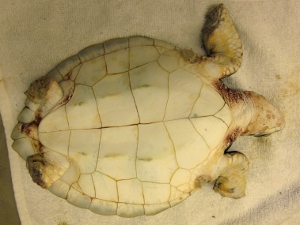 “Independent experts and leading scientists from institutions such as the University of Oxford, Murdoch University and the Emergent Disease Foundation have reviewed and endorsed our evidence. Furthermore, well established conservation bodies such as the Sea Turtle Conservancy, and Caribbean conservation organizations’ such as YWF-KIDO Foundation in Grenada (which is also part of WIDECAST) and FAADA (Spanish Foundation for the Protection of Animal), are also in support of our recommendations to the farm,” the WSPA added.
“Independent experts and leading scientists from institutions such as the University of Oxford, Murdoch University and the Emergent Disease Foundation have reviewed and endorsed our evidence. Furthermore, well established conservation bodies such as the Sea Turtle Conservancy, and Caribbean conservation organizations’ such as YWF-KIDO Foundation in Grenada (which is also part of WIDECAST) and FAADA (Spanish Foundation for the Protection of Animal), are also in support of our recommendations to the farm,” the WSPA added.
Acknowledging that the CTF has released some 31, 000 sea turtles since 1968, only 11 of the 200 sea turtles nesting on local beaches this year had Turtle Farm tags. The Farm also admitted in documents released under the FOI law that the number of animals released is falling, with an average of only 27 turtles per year over the last five years. The FOI request also showed that the extremely poor welfare conditions at the CTF are causing a high degree of sea turtle mortality. Over the last five years at least 300 green sea turtles have died on a yearly basis. This means that between 2007 and 2011 alone 2,299 green sea turtles have died at the farm outside of those slaughtered for meat.
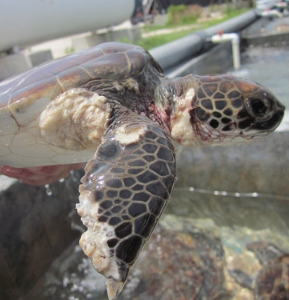 WSPA said it is not calling for the CTF to shut down all of its operations but to operate as a rehabilitation release, research and education facility that can still draw tourists. It recommends a shift away from commercial production for human consumption to conservation, but said the Farm should “immediately halt the inhumane public handling of turtles due to the animal welfare concerns associated with this activity.”
WSPA said it is not calling for the CTF to shut down all of its operations but to operate as a rehabilitation release, research and education facility that can still draw tourists. It recommends a shift away from commercial production for human consumption to conservation, but said the Farm should “immediately halt the inhumane public handling of turtles due to the animal welfare concerns associated with this activity.”
The charity said it first contacted the farm in May to express concerns. “We met with relevant CTF stakeholders in July 2012 to explore ways to collaborate; agreed a two month consideration period when it was made clear that the issue needed to be considered by senior politicians and subsequently provided a five week extension when the CTF failed to meet the agreed deadline,” it added.
Although the CTF claims to be taking the evidence seriously, as it has commission an independent review for December, the WSPA said that because of the repeated inaction despite its attempts to work with the farm aswell as the recent tragic incident loss of 300 more turtles after a tank failed during a leak repair, it had come to the conclusion that the Farm has little interest in working with it to find a solution to the animal welfare issues.
“This has left us with no option but to share our concerns with the general public, which we hope will encourage the CTF to address our concerns,” the charity stated.
It is clear that the organisation intends to push ahead with the campaign. Since going public with the report last week and creating a website at the weekend, which includes the visual and scientific evidence it uncovered during its research at CTF, some 8,800 people have signed up to join the campaign. Although the Farm has faced international criticisms in the past, this is the first time it has faced a campaign of such magnitude backed by scientific and visual evidence and spearheaded by a well-known and well respected global organisation.
See full statement from WSPA below and more details at www.stopseaturtlefarm.org
Related article on CNS story along with government statements.
Photos supplied by WSPA.

ACC has ten active cases
 (CNS): Since its creation in January 2010 the Anti-Corruption Commission (ACC) has kept a low profile and been tight lipped about the investigations it has undertaken, and only one person has been charged under the relevant legislation. However, it has now produced a newsletter and begun publishing minutes of meetings on its website. According to the latest minutes, the RCIPS Anti-corruption Unit is actively working on ten live investigations, having received some 53 complaints since its inception. In the newsletter the ACC says that while the destructive results of corruption are obvious, in practice it is difficult to identify corruption in every case.
(CNS): Since its creation in January 2010 the Anti-Corruption Commission (ACC) has kept a low profile and been tight lipped about the investigations it has undertaken, and only one person has been charged under the relevant legislation. However, it has now produced a newsletter and begun publishing minutes of meetings on its website. According to the latest minutes, the RCIPS Anti-corruption Unit is actively working on ten live investigations, having received some 53 complaints since its inception. In the newsletter the ACC says that while the destructive results of corruption are obvious, in practice it is difficult to identify corruption in every case.
In the latest minutes which have been published on the website from the commission’s August meeting, Detective Inspector Richard Oliver, who is one of the RCIPS’ Anti-corruption Unit officers, reported on the types of cases being handled by the unit, the workload and the resources needed. Specific details such as names, locations and dates were not included in the minutes due to security issues.
Since inception there have been 53 complaints registered with the ACC. Of those, 20 are 'pending' and waiting further or sufficient information which may make it appropriate to make further investigations. Another 20 have been concluded, three have been transferred to other investigative units for action and ten are under current active investigation.
In the commission’s second ever newsletter, the ACC offers advice to civil servants about receiving gifts and whether it is ever appropriate even if the intention is not corrupt.
“The intention behind the giving of a gift — and what the community may perceive as the intention — should always be considered in determining whether accepting the gift is appropriate,” the letter states. “Public officials need to have a very clear understanding of what to do when they are offered a gift or benefit and the implications of accepting a gift or benefit. The offer of gifts or benefits can present a corruption risk because it has the potential to affect the impartiality and integrity of the agency in carrying out its functions.”
Although gifts and benefits may be offered out of gratitude and goodwill for a job well done, they can also be a subtle form of influence creating a sense of obligation that may compromise impartial and honest decision making, the ACC warned.
Advising managers to make a risk assessment of conflicts of interest in their departments, the ACC said that this can help identify any undue influence or bribery that may be going on. Government departments need to introduce policy and procedures for the management of gifts and benefits, which include sanctions for any breach of the procedures, train employees, record all gifts and prohibit employees from accepting or soliciting cash or gifts under any circumstances.
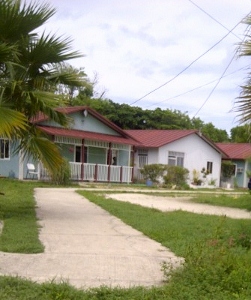
Old AG report still reveals lessons for government
 (CNS): The first report conducted by the Office of the Auditor General (OAG) into the local affordable housing scheme shows that government was warned more than eight years ago about the problems that can arise when it fails to follow due process. Reflecting on the report he wrote in August 2004, the former auditor general, Dan Duguay, told CNS that, as old as the report was, it still had some value to government. “There are still lessons to be learned of the dangers of going without proper procurements, which is a recent theme in government. It seems like sometimes government never learns,” Duguay said after the report was released following a freedom of information request by CNS.
(CNS): The first report conducted by the Office of the Auditor General (OAG) into the local affordable housing scheme shows that government was warned more than eight years ago about the problems that can arise when it fails to follow due process. Reflecting on the report he wrote in August 2004, the former auditor general, Dan Duguay, told CNS that, as old as the report was, it still had some value to government. “There are still lessons to be learned of the dangers of going without proper procurements, which is a recent theme in government. It seems like sometimes government never learns,” Duguay said after the report was released following a freedom of information request by CNS.
The audit had been kept under wraps for so long because it was conducted before the relevant rules relating to the auditor general’s reports were altered to allow the office to release its work to the public a few days after being seen by the Public Accounts Committee members.
The report was finally examined by the parliamentary committee at its last meeting in September, when Dr Frank McField gave evidence to the committee and defended the way in which the project had been procured and the quality of the homes.
The current auditor general, Alastair Swarbrick, said that his office was not going to spend any considerable time going over the findings as it was some eight years old. However, he said that the issues raised by his predecessor in the old report are almost identical to those his office is still raising in the more recent reports relating to procurement.
Following its release, Duguay pointed out that it wouldcertainly have been far more useful if his work had been issued earlier as the main problems could have been probed and resolved much quicker.
“It raised several important points but the most important one is that contracts were issued without tender. There is also good evidence that local contractors could have done a good job at nearly the same costs but they were not permitted to bid,” Duguay said.
He also pointed to issues concerning not adhering to building standards, which have unfortunately proven to be true as the homes are now rusting out.
The publication of the old report comes in the wake of news from the current National Housing and Development Trust that the new homes currently being constructed under the initiative will no longer be sold but rented and the admission that building genuinely affordable homes in the Cayman Islands for those that cannot buy on the open market is impossible.
Plagued with problems from the get-go, the current NHDT boar chair Rayal Bodden and the general manager Julius Ramos said that these issues are now behind the trust. The men said that the public could rest assured that not only are the houses now being developed by the Trust up to standard but that the money it handles is also all accounted for.
“The NHDT has carefully considered recommendations of old audits and investigation reports and implemented effective systems to ensure proper checks and balances,” the officials said in a statement released Friday. “This has resulted in a good working relationship with the Auditor General’s Office for the past few years.”
The NHDT is also in the process of developing a new website that will include meeting minutes, financial statements, the publication scheme, NHDT’s public service information and application forms, as well as a “Homes-For-Sale” database.
In the meantime, the trust encouraged interested parties to make Freedom of Information requests to foi.nhdt @gov.ky
Retaled articles:
See AG's report here
See statement from NHDT below.

FCU: Not enough suspicious activity reports filed
(CNS Business): The volume of suspicious activity reports (SARs) being filed in the Cayman Islands is far too low considering that the jurisdiction is the fifth largest in the world, according to Detective Superintendent Brian Donley, lead in the RCIPS Financial Crimes Unit. DS Donley said that there had to be more suspicious activity taking place in Cayman and compliance officers were either being prevented from reporting such suspicious activity or were just not seeing it. Better relations between the authorities and the private sector might improve the situation, he believed but thought the authorities were sometimes slow in responding back to the private sector once they had reported a SAR for many reasons, one of which was that sometimes people politically linked within the island might be involved in the suspicious activity report and such cases could take years to solve. Read more on CNS Business

Survey finds 50% want bigger marine parks
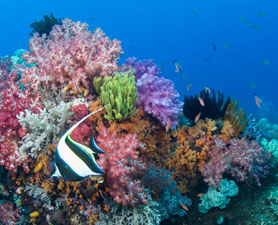 CNS): Following responses from almost 1000 people to the Department of the Environment’s consultation survey regarding the future of Marine Parks in Cayman, the proposals for the new designations will be revealed in details by the DoE over the next few weeks. Gina Ebanks- Petrie the DoE director said that over half of those who responded wanted to see extended protection for Cayman’s marine habitat and 90 per cent wanted to see more law enforcement. Only 10% of those who took part said that they did not wish to see any changes. The review of the current marine parks and zones has revealed that the law has helped to protect the country’s fragile marine habitat but it is clear more needs to be done, the director said.
CNS): Following responses from almost 1000 people to the Department of the Environment’s consultation survey regarding the future of Marine Parks in Cayman, the proposals for the new designations will be revealed in details by the DoE over the next few weeks. Gina Ebanks- Petrie the DoE director said that over half of those who responded wanted to see extended protection for Cayman’s marine habitat and 90 per cent wanted to see more law enforcement. Only 10% of those who took part said that they did not wish to see any changes. The review of the current marine parks and zones has revealed that the law has helped to protect the country’s fragile marine habitat but it is clear more needs to be done, the director said.
Local experts have said that the coral reefs in Cayman still need more protection as threats intensify. With proposals on how to do that now complete the first meeting will be on 23 October when the DoE will reveal what it hopes will become the new boundaries for no take zones among other changes and gather public opinion on the proposals for further protection for the next 25 years. The proposals are based not just on scientific research but from the information gathered during the public survey period which started a year ago.
The goal, Ebanks- Petrie explained, is to increase the protected areas on the reef eventually from 15% to around 40% changing some replenishment zones to no take and extending across the local reef shelve and down the wall.
“Long-term protection allows the entire range of species and habitats to recover,” she said, adding that it gives critical marine creatures time to grow and mature. “As larger fish produce more eggs, this benefits the ecosystem and fishery. If no-take areas are re-opened, the benefits of improved ecosystem health and a bigger fishery can be quickly lost,” she warned as she invited everyone to come out to look at the future proposals and offer their view.
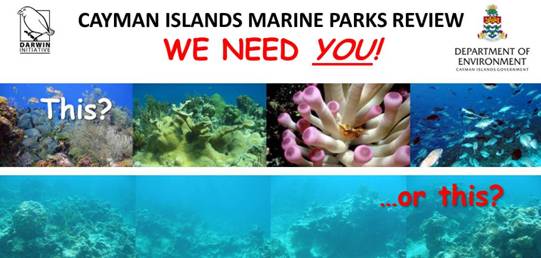
“If we want to continue to fish in the future and make money from tourism, we need to make sure we look after what we have,” Ebanks-Petrie added emphasizing that the need to expand the protection. “Healthy coral reefs and mangroves provide critical coastal protection to our small, low-lying islands and coral reefs are one of the most diverse and fragile ecosystems on earth.”
The parks were created 25 years ago and while they have proved to be successful, they need to be extended and that extension needs public support the DoE boss stated. There are now new threats to consider associated with climate change, such as a warming ocean, increases in sea surface temperature, more storm activity, ocean acidification and sea level rise.
See details of public meeting schedule below

Fraudster steals over $850K
(CNS): A Cayman based insurance manager has admitted stealing over US$856,000 from an insurance firm and its clients. David Self pleaded guilty to two counts of theft and one count of possession of criminal property on Friday morning in the Grand Court. Self had originally faced some 18 counts of theft and fraud relating to almost US$1 million but after negotiations with the crown the indictment was changed to roll the charges together. Self was remanded in custody to HMP Northward ahead of his sentencing hearing, which is scheduled for 30 November. According to a civil claim in the Grand Court, Self’s fraud resulted in the collapse of Monkton Insurance, which was registered in Cayman in 1997 and regulated by CIMA.
The theft took place throughout 2011 and Self (53) was arrested in February this year. Then in April liquidators filed a petition in the Grand Court to wind up the business, described as “hopelessly insolvent” as a result of the misappropriation of funds. Since then, Self has also been served with several suits in an effort to recover the cash from related firms.
Self has admitted stealing $856,000 from Warco Insurance, one of two claimants.
In June the local Insurance Managers Association had claimed the crime was exposed because of the local regulatory system. IMAC said that while news of the crime was not welcome, it illustrated that the regulatory environment had performed in exactly the way it should and had brought the alleged fraud to the attention of the authorities.
However, the court heard Friday that Self had perpetuated the fraud over a twelve month period before the crime was exposed.
Related articles on CNS Business: